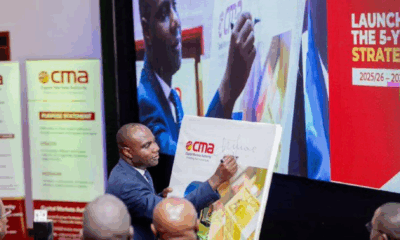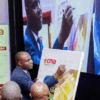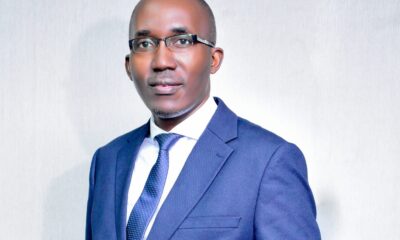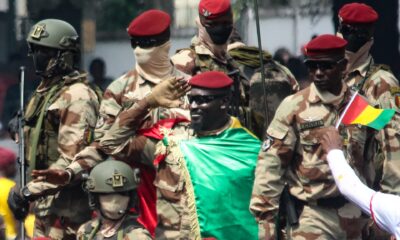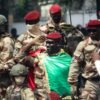Ramathan Ggoobi
Shilling Freefall: political uncertainty killing economy
Political uncertainty, heightened by the pre- and post-Kyankwanzi events are causing anxiety.
Similar approach; similar results: Amin wanted to buy legitimacy of his coup by expelling Asians; Museveni wanted to buy a fifth term by expelling gays!
Last week, and avoid the repeat of 2011 when the shilling became the worst performing currency in the world after depreciating to Shs. 2, 901 on September 23, the BOU quickly intervened in the foreign exchange market by selling dollars.
The sterilization requirement (selling dollars directly by BOU) came just weeks after Bank had mopped up over 227 billion shillings, using repurchase agreements at a weighted average rate of 11%, to try to maintain price stability.
The BOU attributed the freefall in the value of the shilling to “negative sentiments about the impact of aid cuts by donors and the exit of offshore investors following the lowering of interest rates on government securities.”
The negative exchange movements could also be a result of the huge trade deficit, which the Minister of Finance projected at $2.4 billion in 2013/14 while reading the budget on June 12. The deficit increased mainly due to the unrest in South Sudan, our major regional market.
Although the factors above could partly explain our deteriorating economic situation, it is the political uncertainty, heightened by the pre- and post-Kyankwanzi events.
Business at its lowest
The analysis of the economy by authorities such as the BOU, IMF and other agencies is macro and to a larger extent not a good representation of the actual situation on ground. A micro analysis of the economic situation in Uganda today will reveal a more telling story. An average Ugandan is doing very badly right now. There is general paucity of cash, yet prices for essential goods and services, including food and utilities are either rising or already high.
The Ugandans owning small businesses down town Kampala and elsewhere in the country are saying things are not good; business is at its lowest. Those who borrowed money from financial institutions are struggling to repay their debts and banks are reluctant to lend to others.
Even government itself is struggling to raise revenue to finance its expenditures. Mr. President, you are struggling to pay teachers and police, and other public servants. To confirm the crisis you found yourself in, you have introduced taxes on essential commodities such as seeds, fertilizers, salt, paraffin, widows vending food and vegetables etc.
Like I wrote here a fortnight ago, this self-inflicted crisis is on account of a number of mistakes that you committed in a bid to retain power at all costs. Leaders make mistakes not because they can’t foresee the ramifications of their bad decisions. It is when leaders realise that their legitimacy has become questionable that they resort to populist ways of retaining power.
Idi Amin expelled Asians not because he was a mad man or that he hated them. No. Actually many of the expelled Asians were Muslim Pakistanis, the religion Amin professed. Amin’s move to “Africanise” Ugandan economy, just a year in power, was a populist agenda to win over the hearts of Ugandans following the 1971 coup. Unfortunately, like many populist decisions, it failed him. Instead, it earned him international isolation which led to loss of aid and commercial credits.
Sanctions by America
From that time onwards, Amin could not generate the economic resources required to maintain support from the military and the elite. The shilling quickly lost value thereby reducing the value of government salaries.
Similarly, in February this year you, Mr. President, signed the Anti-Gay Law to “expel gays” from Uganda. You put pen on paper not because you hated gays. I know you as one of the most liberal leaders Africa has ever had. So why did you sign the anti-gay law, even after assuring the international community that you won’t?
Just like Amin did against Asians, you wanted to ride on the anti-gay sentiments among Ugandans to gain political support. I strongly doubt you would sign that law back in the days when your legitimacy was beyond question. So this was also a populist move which unfortunately has similarly ended up isolating you and your government internationally. Last week, the American government put sanctions against your government and a selected number of officials who were directly involved in the enactment of this law.
Since you signed the bill on February 24, our shilling has slumped by 6.4%, the second largest slump in the world after Ghana’s cedi. Since then, there has definitely been reduced inflow of dollars. The U.S., Norway, Denmark and Sweden have all redirected or withheld aid to Uganda.
I overheard you celebrating that since now we are going to domestically finance the budget at a tune of 82%, we are independent. This reminded me of what Amin said after similar sanctions were imposed on his government following the declaration of the economic war. It cannot be a sign of independence to generate revenue by taxing hoes, seeds, and widows.
How did we get here?
Mr. President, the ways through which you hope to raise the money to finance expenditures of your government are regressive and inefficient, with the possibility of crowding out private investments and affect growth of the economy in the long run. Of course I know I am not teaching you anything new; you are aware of this. But what to do? The oil money that would have provided a fallback position will not come by until after 2017.
The critical question we should ask is how did we get here? Why did we allow the situation to deteriorate to this point? Everything you do nowadays serves to suffocate the economy. The entire nation is engulfed in political uncertainty.
Government itself, right from cabinet all the way to LC 1, is split into camps. It is not uncommon to hear people ask, “To whose camp does Minister so and so belong?” Those that belong to or are simply suspected to the “Mbabazi camp” are subjected to unfair accusations, and the vice versa.
Mr. President, not long ago I wrote about the American disease of “McCarthyism” that came to Uganda when you failed know the right time to hand over power. McCarthyism is the practice of making accusations of disloyalty, subversion, or even treason without proper regard for evidence, especially in order to restrict dissent or political criticism.
There is now a lot of mistrust in government. Leaders can no longer interact freely for fear that those they talk to might be belonging to a ‘wrong’ camp. Generally, there is a heavy cover of political uncertainty in the air.
Legacy at stake
This unclear political atmosphere is causing a lot of anxiety among investors and businessmen. People cannot be sure to make investments in a country where the chemistry between the President and his Prime Minister is visibly distant.
Mr. President, like I usually tell you, investors can tolerate any risk but not political uncertainty. This is mainly because unlike other types of risks, political uncertainty is not insurable. There is no insurance company that sells a policy against political risk. When the BOU announced that there has been a slowdown in capital inflow in the form of foreign direct investments, I knew the reason was beyond the lowering of interest rates on Bonds and Treasury bills they were quoting.
Mr. President, I really feel so bad when I see what is going on in Uganda today. You have been so good to this country. I have always written in these pages that you shouldn’t end badly. You should not be remembered in the same light as some past leaders here and elsewhere in Africa. You should mind about your legacy.
Your story has been phenomenal, but now as you can see we have started to liken you to Idi Amin. You should leave to our generation the good story to tell about you. I don’t know whether you still have any doubt left that you are no longer the one fit to carry this nation forward.
When I watch that advert on UBC television literally begging Ugandans to support your 2016 bid since you’ve brought them World Cup (taxpayer’s money having been spent on it notwithstanding), I gaze in shock. This can’t be my proud Ssabalwanyi. My Ssabalwanyi has never advertised himself like “Kyapa-mbalasi”.
Comments





